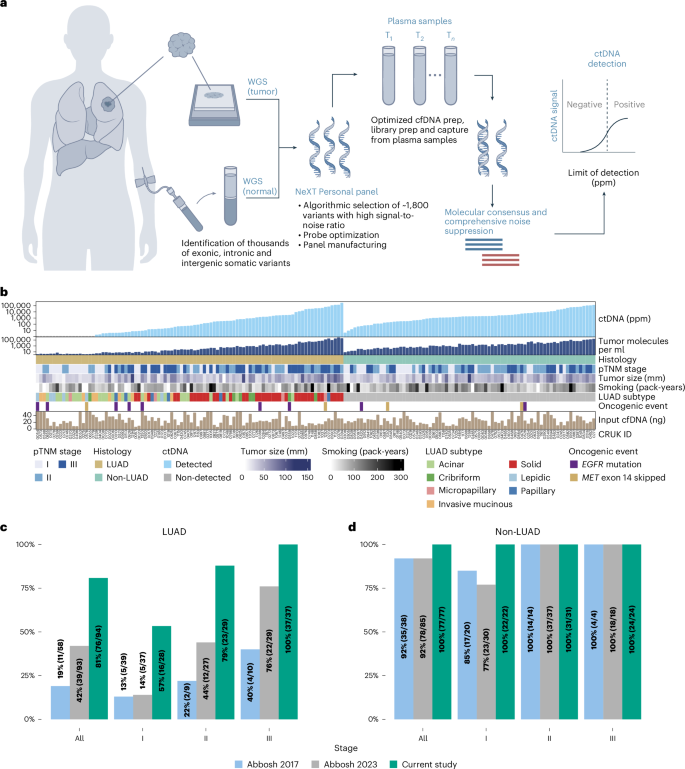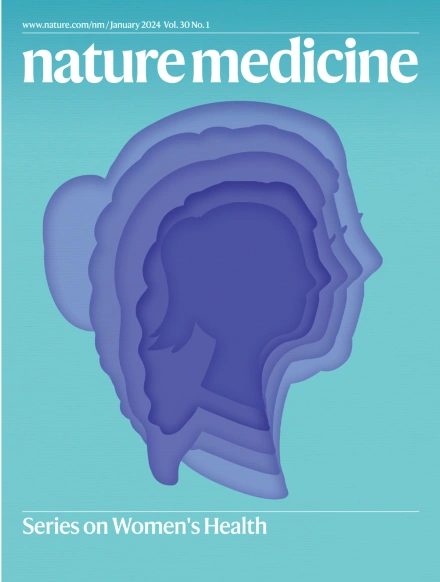超灵敏ctDNA检测在早期肺腺癌术前疾病分层中的应用
IF 58.7
1区 医学
Q1 BIOCHEMISTRY & MOLECULAR BIOLOGY
引用次数: 0
摘要
循环肿瘤 DNA(ctDNA)检测可预测早期肿瘤的临床风险。然而,临床应用受到经临床验证的ctDNA检测方法灵敏度的限制。NeXT Personal 是一种基于全基因组的肿瘤信息平台,经分析验证,它能超灵敏地检测 1-3 ppm 的 ctDNA,特异性高达 99.9%。通过对 TRACERx 研究中 171 名早期肺癌患者的分析,我们在 81% 的肺腺癌 (LUAD) 患者术前检测到了 ctDNA,其中包括 53% 病理 TNM (pTNM) I 期患者。与ctDNA阴性的肺腺癌患者相比,术前ctDNA水平为80 ppm的肺腺癌患者的总生存期缩短。尽管还需要进行前瞻性研究来证实该检测方法的临床实用性,但这些数据表明,我们的方法有可能改善早期 LUAD 的疾病分层。本文章由计算机程序翻译,如有差异,请以英文原文为准。


Ultrasensitive ctDNA detection for preoperative disease stratification in early-stage lung adenocarcinoma
Circulating tumor DNA (ctDNA) detection can predict clinical risk in early-stage tumors. However, clinical applications are constrained by the sensitivity of clinically validated ctDNA detection approaches. NeXT Personal is a whole-genome-based, tumor-informed platform that has been analytically validated for ultrasensitive ctDNA detection at 1–3 ppm of ctDNA with 99.9% specificity. Through an analysis of 171 patients with early-stage lung cancer from the TRACERx study, we detected ctDNA pre-operatively within 81% of patients with lung adenocarcinoma (LUAD), including 53% of those with pathological TNM (pTNM) stage I disease. ctDNA predicted worse clinical outcome, and patients with LUAD with <80 ppm preoperative ctDNA levels (the 95% limit of detection of a ctDNA detection approach previously published in TRACERx) experienced reduced overall survival compared with ctDNA-negative patients with LUAD. Although prospective studies are needed to confirm the clinical utility of the assay, these data show that our approach has the potential to improve disease stratification in early-stage LUADs. In the TRACERx cohort of 171 patients with lung cancer, the ultrasensitive detection of ctDNA improves preoperative patient stratification, also in early-stage disease.
求助全文
通过发布文献求助,成功后即可免费获取论文全文。
去求助
来源期刊

Nature Medicine
医学-生化与分子生物学
CiteScore
100.90
自引率
0.70%
发文量
525
审稿时长
1 months
期刊介绍:
Nature Medicine is a monthly journal publishing original peer-reviewed research in all areas of medicine. The publication focuses on originality, timeliness, interdisciplinary interest, and the impact on improving human health. In addition to research articles, Nature Medicine also publishes commissioned content such as News, Reviews, and Perspectives. This content aims to provide context for the latest advances in translational and clinical research, reaching a wide audience of M.D. and Ph.D. readers. All editorial decisions for the journal are made by a team of full-time professional editors.
Nature Medicine consider all types of clinical research, including:
-Case-reports and small case series
-Clinical trials, whether phase 1, 2, 3 or 4
-Observational studies
-Meta-analyses
-Biomarker studies
-Public and global health studies
Nature Medicine is also committed to facilitating communication between translational and clinical researchers. As such, we consider “hybrid” studies with preclinical and translational findings reported alongside data from clinical studies.
 求助内容:
求助内容: 应助结果提醒方式:
应助结果提醒方式:


